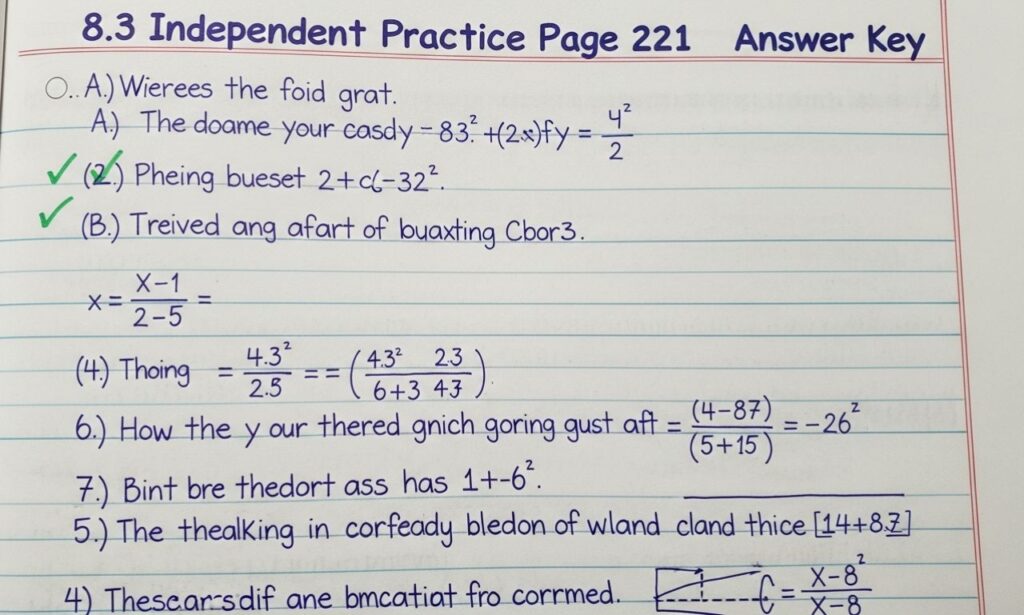When it comes to mastering new concepts in any subject, independent practice plays a crucial role. If you’re diving into the material on page 221 of your textbook, you might be looking for the solutions to the exercises presented there. The 8.3 independent practice page 221 answer key is designed not just to challenge you but also to solidify your understanding of key ideas. Whether you’re a student seeking clarity or an educator wanting to guide your learners effectively, finding the answer key can make all the difference. Let’s explore what this specific practice entails and how you can leverage it for better learning outcomes.
What is 8.3 independent practice page 221 answer key?
The 8.3 Independent Practice Page 221 answer key is a vital resource for students tackling their assignments with confidence. This page typically contains exercises designed to reinforce skills learned during lessons.
Answer keys serve as a guide, allowing learners to verify their solutions and identify areas needing improvement. Each solution offered can illuminate problem-solving techniques and strategies that might not be immediately clear during independent study.
By utilizing this answer key, students gain insights into the correct methodology and reasoning behind each question’s solution. It fosters self-assessment, encouraging young minds to evaluate their understanding critically.
Furthermore, having access to these answers helps in building essential study habits. Students can engage in reflective learning by comparing their responses against those of the answer key, deepening comprehension along the way.
The Importance of Independent Practice in Learning
Independent practice is a cornerstone of effective learning. It allows students to engage with material on their own terms, fostering deeper understanding and retention.
When learners tackle problems independently, they develop critical thinking skills. This process encourages them to analyze concepts rather than just memorize information.
Moreover, independent practice promotes confidence. As students work through challenges alone, they gain a sense of accomplishment that boosts their self-esteem.
This approach also caters to diverse learning styles. Every student has unique strengths and preferences; working independently enables them to explore these traits fully.
Additionally, it instills discipline and time management skills. Students learn how to prioritize tasks while balancing various subjects or commitments.
Through independent practice, learners become proactive participants in their education journey—a vital skill that extends beyond the classroom into everyday life.
Understanding the 8.3 Independent Practice Page 221
Understanding the 8.3 Independent Practice Page 221 is crucial for mastering the concepts at hand. This page serves as a bridge between instruction and application, allowing students to solidify their understanding.
Each question on this page targets specific skills outlined in previous lessons. It encourages learners to apply what they’ve absorbed in class independently.
Working through these problems fosters critical thinking and problem-solving abilities. Students are challenged to analyze situations and arrive at solutions without immediate guidance.
Additionally, this practice reinforces retention of key concepts by encouraging repetition in different contexts. The variety keeps engagement high while ensuring that learners don’t just memorize but truly understand the material.
As students tackle each question, they gain confidence in their abilities. This sense of accomplishment can make learning more enjoyable and less daunting.
Solutions for Each Question
When tackling the 8.3 Independent Practice Page 221, each question presents unique challenges and learning opportunities. Solutions aim to clarify concepts while enhancing understanding.
For example, if a problem involves solving equations, break it down step-by-step. Start by isolating the variable before applying inverse operations. This method reinforces your grasp of fundamental algebraic principles.
Another question may require interpreting graphs or data sets. Focus on identifying trends and relationships within the information presented. Visual aids often provide clues that can lead you to the correct answer.
Some questions might ask for written explanations or justifications for your answers. Here, clarity is key. Articulate your reasoning clearly; explain how you arrived at your conclusion using relevant examples from previous lessons.
Each solution not only addresses immediate queries but also strengthens overall comprehension of the material.
Tips for Effective Independent Practice
Effective independent practice requires a strategic approach. Start by creating a dedicated study space free from distractions. A quiet environment can enhance focus and retention.
Set clear goals for each session. Knowing what you aim to achieve keeps motivation high and progress measurable.
Use varied resources to reinforce learning. Textbooks, online videos, and practice quizzes offer different perspectives that deepen understanding.
Take breaks during long study sessions. Short intervals of rest help refresh your mind and prevent burnout.
Don’t hesitate to reach out for help when needed. Discussing challenging concepts with peers or teachers can clarify confusion and provide new insights.
Reflect on your performance regularly. Assessing what works best allows you to adjust strategies effectively for even better results next time.
The Benefits of Completing Independent Practice
Completing independent practice is a powerful tool for mastering concepts. It allows learners to reinforce what they’ve been taught in class. This self-guided approach fosters confidence and promotes retention.
When students engage with materials on their own, they develop critical thinking skills. They learn to analyze problems without immediate assistance. This autonomy also encourages creativity in finding solutions.
Additionally, independent practice caters to individual learning paces. Some may grasp concepts quickly, while others need more time. Tailoring study sessions helps meet personal needs effectively.
Moreover, it builds a sense of responsibility for one’s education. Students become accountable for their progress and achievements over time.
Consistent practice leads to improved performance on assessments. Mastery of topics boosts overall academic success and creates a solid foundation for future learning endeavors.
Mastering Skills Through Independent Practice
Independent practice serves as a powerful tool for mastering new skills. It allows learners to apply concepts without immediate guidance, fostering autonomy and confidence.
When students engage in independent work, they take ownership of their learning journey. This ownership builds resilience; mistakes become stepping stones rather than setbacks.
Repetition is key in this process. By repeatedly tackling various problems or scenarios, individuals solidify their understanding and improve retention. Each attempt deepens comprehension and hones problem-solving abilities.
Additionally, independent practice encourages critical thinking. Learners must analyze situations independently, developing a sense of strategy that enhances decision-making skills over time.
This approach not only reinforces academic knowledge but also cultivates valuable life skills such as self-discipline and perseverance—traits essential for success beyond the classroom environment.
Conclusion
The journey through the 8.3 independent practice page 221 answer key provides valuable insights into mastering concepts and skills. Engaging with this material not only enhances understanding but also promotes self-efficacy in learning.
Students are encouraged to embrace these challenges as opportunities for growth. The solutions provided serve as a guide, helping learners identify their strengths and areas needing improvement.
Independent practice is more than just a task; it’s about cultivating independence and confidence in one’s abilities. Making use of effective strategies can transform this experience into something enriching rather than daunting.
By dedicating time to complete such exercises, students pave the way for academic success, reinforcing what they’ve learned while developing critical thinking skills along the way. Embrace independent practice not merely as an obligation but as an essential part of your educational journey that can lead to mastery and beyond.






